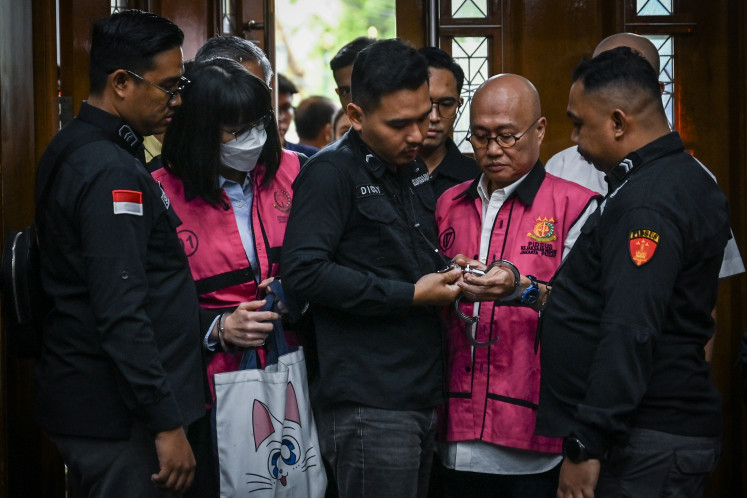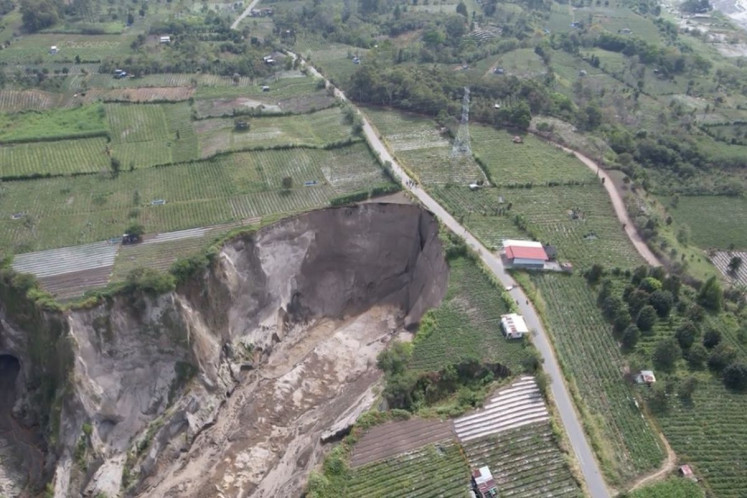Popular Reads
Top Results
Can't find what you're looking for?
View all search resultsPopular Reads
Top Results
Can't find what you're looking for?
View all search results2024 elections chance to ‘rejuvenate democracy’ in Southeast Asia
From the Philippines to Thailand, Southeast Asia is showing signs of democratic regression and stagnation, making Indonesia's 2024 elections more important for the region's democracy.
Change text size
Gift Premium Articles
to Anyone
 Members of the Victim Solidarity Network for Justice (JSKK) hold the 792th Kamisan rally in front of the State Palace on Oct. 26, 2023. Commemorating Youth Pledge Day, which falls on every Oct. 28, the network urged the government to commit to building democracy and supporting the reform agenda by stopping corruption, collusion and nepotism and guaranteeing a constitutional enforcement of law and human rights. (Antara/Wahyu Putro A)
Members of the Victim Solidarity Network for Justice (JSKK) hold the 792th Kamisan rally in front of the State Palace on Oct. 26, 2023. Commemorating Youth Pledge Day, which falls on every Oct. 28, the network urged the government to commit to building democracy and supporting the reform agenda by stopping corruption, collusion and nepotism and guaranteeing a constitutional enforcement of law and human rights. (Antara/Wahyu Putro A)

In a region that is witnessing democratic stagnation and regression, it is hoped that Indonesia may demonstrate progress as the country enters its election season for next year, making it an important role model for Southeast Asia, a conference heard recently.
Scholars and experts from several countries in the region, including Indonesia, Malaysia, Thailand and the Philippines, convened at the Indonesian International Islamic University (UIII) in Depok, West Java, from Thursday to Friday, where they discussed election results in the region and their impact on democracy and human rights.
Throughout the talk, analysts agreed that Southeast Asia is currently backsliding or, at the very least, stagnating, with regard to democracy as a result of domestic political occurrences around or during elections.
Indonesia, for example, has seen many indications of democratic regression leading up to the 2024 elections. The nation has increasingly become subject to a phenomenon called “presidentialization”, where incumbent President Joko “Jokowi” Widodo has tended to govern without much outside interference, especially during his second term, according to Djayadi Hanan, UIII senior lecturer and executive director of the Indonesian Survey Institute (LSI).
“Indonesia’s democratic breakdown possibly stems from its weak rule of law,” Djayadi said in the discussion on Thursday, “shown by the personalization of political parties, executive aggrandizement and the public’s low trust in the legislative bodies and political parties.”
He also cited the recent Constitutional Court ruling on the age requirements for presidential and vice presidential candidates, allowing people below 40 years old to run, provided they have prior experience as elected regional heads.

The ruling allowed Jokowi’s eldest son, Surakarta Mayor Gibran Rakabuming Raka, to be nominated as Gerindra Party patriarch Prabowo Subianto’s running mate. Many observers have slammed the ruling as a blatant attempt at establishing a political dynasty.

















